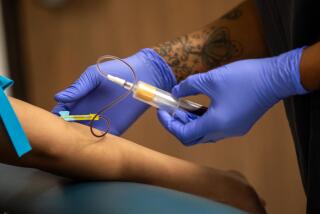Federal Vouchers Urged for Free AIDS Testing
- Share via
AIDS pioneer Dr. Michael S. Gottlieb recommended Wednesday that the federal government issue vouchers good for free AIDS tests to all potentially sexually active Americans, down to junior high school age.
“This is an opportunity for Washington to once again get involved at the household level,” said Gottlieb, referring to an action several years ago by then Surgeon Gen. C. Everett Koop, who sent educational brochures to households around the nation.
For the record:
12:00 a.m. June 19, 1992 For the Record
Los Angeles Times Friday June 19, 1992 Valley Edition Metro Part B Page 4 Column 6 Zones Desk 1 inches; 34 words Type of Material: Correction
Wrong hospital--A picture caption Thursday erroneously said a photograph of Dr. Michael Gottlieb talking with an AIDS patient was taken at Valley Hospital Medical Center. The picture was taken at the Sherman Oaks Hospital and Health Center.
Gottlieb, the Sherman Oaks physician who reported what were then the first known cases of acquired immune deficiency syndrome in 1981, made his remarks in an address to the LifePlus Clergy Network, an educational organization for members of the clergy in the San Fernando Valley, meeting at Valley Hospital Medical Center in Van Nuys.
Gottlieb, in a wide-ranging briefing on the status of the AIDS epidemic, which he fears could become endemic in the population, said he was opposed to universal AIDS testing when the medical community debated the issue several years ago. But he has had a partial change of heart because the disease continues to spread into population groups beyond homosexual men and intravenous drug users, he said.
Gottlieb conceded that many people would throw the vouchers away, either because they would assume they were not in danger of contracting AIDS or because they would prefer not to know if they had the disease. But with the availability of universal free testing, “cost and confidentiality would no longer be barriers” to people who want to know if they are infected, he said.
Los Angeles County now funds a free testing program at a clinic in the San Fernando Valley.
Gottlieb suggested that clinics contract with the government to perform the tests, which would be done privately. He said each test might cost the government from $15 to $20, but he could not predict the overall cost of a national voucher program. He agreed that it might be too expensive to issue the vouchers on an annual basis.
The latest figures show that 220,000 Americans have been diagnosed with AIDS and 141,000 have died. Gottlieb said he believes that the disease is so well established in the population that it will be around for many years. “It’s going to stay in the U.S. population as an endemic virus for the rest of our lifetime, if not the lifetimes of our children and our children’s children,” he said.
But the news is not all grim. Gottlieb said the general population seems much less afraid of those who have the disease than several years ago, when a Florida family with three AIDS patients was firebombed out of their house.
“More and more of my patients are moving back home, to places like Detroit, Little Rock, small towns in Texas,” he said. “Remarkably, patients are being welcomed to their hometowns with very little hitch. That represents an important change.”
He said this growing acceptance of the disease and those suffering from it should allow elected officials to speak up more about the need to confront the disease without fear of censure from their constituents.
He also praised the “remarkable progress” of the Food and Drug Administration in eliminating red tape to allow anti-AIDS drugs to reach the public faster than ever.
Gottlieb did not dispute criticism that more money per capita is being spent to battle AIDS than is being spent on breast cancer or common diseases that kill thousands of children every year. Gottlieb responded that more money should be spent on combatting breast cancer and the childhood diseases as well.
“There should not be competition between disease constituencies,” he said. He said the success of activists in pushing for increased spending on AIDS research has “set forth a model other disease activists can use.”
More to Read
Sign up for Essential California
The most important California stories and recommendations in your inbox every morning.
You may occasionally receive promotional content from the Los Angeles Times.










